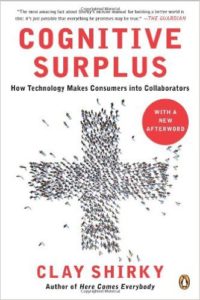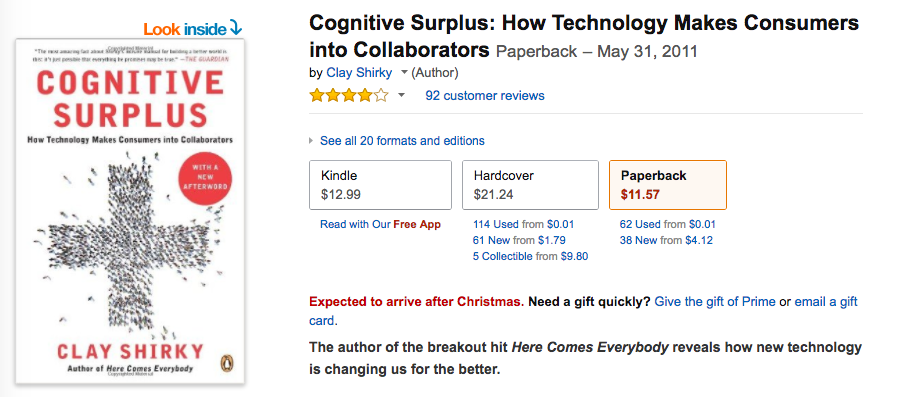A friend bought me this book. It isn’t the type of book that I’d normally pick out, but I like to experiment with reading different types of books.
 In Cognitive Surplus, Clay Shirky explains how technology is changing our culture and our every day life. Being in the tech field, you can bet I was curious about what points he was going to bring up!
In Cognitive Surplus, Clay Shirky explains how technology is changing our culture and our every day life. Being in the tech field, you can bet I was curious about what points he was going to bring up!
Overall, I thought that the book was a bit difficult to read. It used unnecessarily sophisticated language. It was a tad dense.
Many of the Amazon reviews seemed positive, though there were also some negative ones that echoed some of my own thoughts. I’ve quoted one below.
“Someone suggested I read Clay Shirky’s new book, Cognitive Surplus on crowdsourcing given my work in the field. I have to say that I am underwhelmed.
While he talks a great deal on an esoteric level about crowd movements and this conversation is certainly worthy of a thought leader, he offers no pragmatic research or personal experiences building such movements, which would create a first hand understanding of social motivations within groups. Further, based on my personal experiences, this book fails to grasp the trials of actual movement building and community development. While certainly a good chew for arm chair cowboys, I wouldn’t recommend this to read to practitioners.”
I have to agree with the above reviewer. Because I’m so deep in this field, I didn’t take much away from the book. I wouldn’t go out of my way to recommend it to a colleague. However, it did spur some interesting ideas and thoughts, which I’ll include below. I think that if you’re not in the tech field or aren’t very tech savvy, this could prove to be an interesting book!
Notes and Quotes
“What job is a customer hiring that milkshake to do at 8 AM”
“With a large enough crowd, the unpredictable events becomes predictable.”
Invention of printing press spurred the spread of knowledge.
Novelty is a high risk operation in many cases.
Have members before you have a mission.
“Even though they had played with the puzzle voluntarily in the first session, the memory of having been paid earlier was enough to depress their interest when they were again given the chance to experiment with the puzzle on their own.”
“Deci’s conclusion that payment can crowd out other kinds of motivation flew in the face of both existing theory and practice.”
“Amateurs generally use public access not to reach the broadest possible audience, but to reach people like themselves.”
Most people want a feeling of community and sense of belonging.
Selfishness and market forces are oppositely correlated.
Gin craze 1700s
